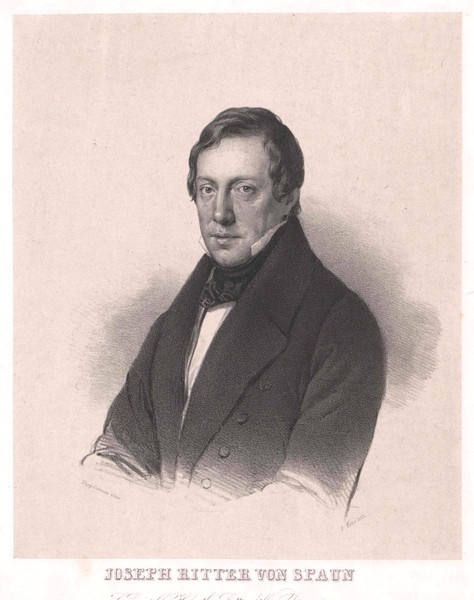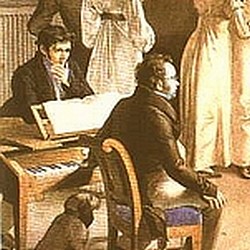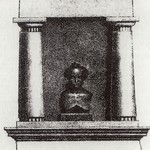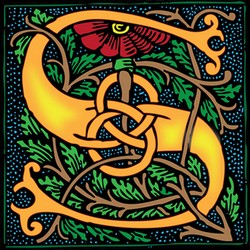
This name, Josef von Spaun, has appeared on this blog several times. Once, as the poet of a single Lied by Schubert, Der Jüngling und der Tod; always, as a friend of the composer. As I explained some other times, they met at the Stadtkonvikt. It was a boarding school where children from wealthy families were prepared for university, and also children on scholarships who sang at the Imperial Chapel's choir and who were allowed to stay even after their voice changed if their academic results were good enough. This way, as a choirboy, in October 1808 Franz Schubert joined a select school out of reach of other children from his own environment. The most gifted students were selected to play at the school’s orchestra, and the 11-year-old Franz and Josef, about 20, first met when sharing the music stand.
Josef was very fond of that timid and serious boy who loved music with as much passion as he did and who was, he had no problem admitting it, much better musician than he was. In those early years he encouraged him to compose, making sure that he had enough paper to write his music (you wouldn’t believe how pricey paper was!), and took him to attend his first opera performances; later on, he used his contacts to disseminate Schubert's music and always bearing in mind how important friendship was for Franz, Josef introduced him to all those friends he thought both would get along with.
This friendship lasted until Franz's death, but for a few years they stayed physically apart. In the fall of 1821, Josef left Vienna to work in Linz, his hometown, and didn't return until 1826. During those years, both friends hardly ever met and kept in contact mostly by letter.
In January 1822, only a few weeks after Spaun had left, his friends were missing him dearly. They wrote him, but he didn't answer as soon as they wanted; probably, he was still settling in and didn't have much time to please his impatient friends. So they tried to claim his attention in a very original way: they composed a song for him. Matthäus von Collin, Spaun's cousin, wrote the lyrics and Franz Schubert, the music. The Lied, Herrn Josef Spaun, Assessor in Linz, is an example of the group's good mood and Schubert's skill in composing Italian style.
He had chosen to compose in his own language, Lied, but also opera; it was a matter of personal conviction. Like Weber, whose opera Der Freischütz had been premiered that fall in Vienna, he wanted to follow the path that Mozart and Beethoven had begun, although Italian opera ruled in Vienna at that time. In fact, the impresario Barbaja had just arrived from Naples; he invited Rossini to Vienna in 1822 and, as you can imagine, people went crazy about him. I don't know to what extent Barbaja knew his hiring had been a government manoeuvre to get rid of the German opera; I don't know either if Schubert understood that was the end of his opera career. The thing is that, as a member of the audience, he really liked Italian opera and, as a composer, he knew all its secrets (just remember he had been one of Antonio Salieri's favourite students).
I can imagine Schubert, Collin and other friends having fun while writing their complaints to Spaun. Their letter took the form of recitative and aria in the purest Italian style, but in German. The text parodies the libretti of that time, with the usual hyperbole; the music of this piece, subtitled Musikalischer Schwank, "musical farce", does not lag behind, it's almost a scena di bravura. I hope Spaun finally wrote his friends back after getting such a well-thought-out missive!
This fun musical joke is rarely heard in recitals; I'm talking about it today because Natalia Labourdette and Anastasia Timofeeva will perform it tomorrow at L'Auditori, at the Schubert Lied cycle. I hope you can attend the recital or, at least, listen to our version; we're listening to Herrn Josef Spaun, Assessor in Linz (also known as Epistel) performed by Janet Baker and Gerald Moore.
Recitativo
Und nimmer schreibst du?
Bleibest uns verloren,
Ein starr Verstummter,
Nun für ew’ge Zeit?
Vielleicht, weil neue Freunde du erkoren?
Wardst du Assessor denn am Tisch so breit,
Woran beim Aktenstoss seufzt Langeweile,
Um abzusterben aller Freudigkeit?
Doch nein, nur wir sind’s.
Nur uns ward zuteile
Dies Schweigen, dies Verstummen und Vergessen.
Armut und Not selbst an der kleinsten Zeile!
Für jeden bist du schriftkarg nicht gesessen;
Für manchen kamen Briefe angeflogen,
Und nach der Elle hast du sie gemessen;
Doch uns, Barbar, hast du dein Herz entzogen!
Aria
Schwingt euch kühn, zu bange Klagen,
Aus empörter Brust hervor,
Und, von Melodien getragen,
Wagt euch an des fernen Ohr!
Was er immer mag erwidern,
Dieses hier saget doch:
„Zwar vergessen, jenes Biedern
Denken wir in Liebe noch!“
Please follow this link if you need an English translation.
As always, there are some other Lieder from this concert that we've listened so far:

















Comments powered by CComment